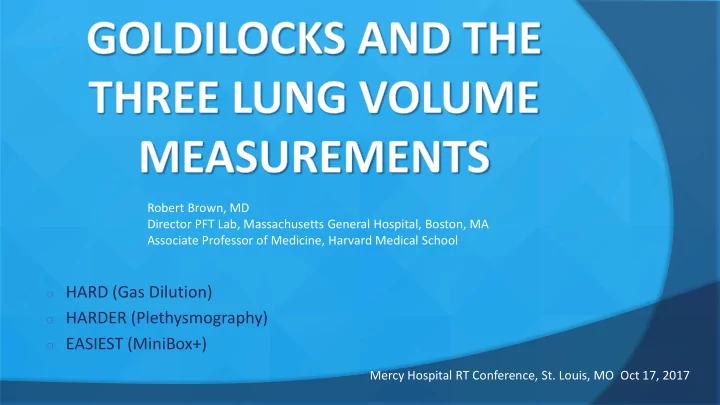

Robert Brown, MD Director PFT Lab, Massachusetts General Hospital, Boston, MA Associate Professor of Medicine, Harvard Medical School o HARD (Gas Dilution) o HARDER (Plethysmography) o EASIEST (MiniBox+) Mercy Hospital RT Conference, St. Louis, MO Oct 17, 2017
Disclosure NONE ON SAB OF PULM-ONE NO PAYMENT, NO EQUITY
Paths of Helium Loss Solution in H2O (negligible) Equipment leaks (equilibration fails) Leaks around nose clip, mouthpiece Ruptured tympanic membrane Swallowing Absorption into fluids, tissues
HELIUM ANALYZER Range 0-10% Resolution: 0.01% 95% response time of < 15 sec to 2% step change in HE concentration < 0.02% drift for 10 minutes
End of Test Criteria Δ [HE] < 0.02% in 30 secs (3x, z 15 seconds) Based on: Limits of resolution of He meter Estimate of Δ [He] of < 0.01% per minute due to He absorption and N2 excretion
Helium vs Plethysmograph NORMAL: results very similar RESTRICTION: results very similar OBSTRUCTION: Pleth >helium but……CONTROVERSIAL
Helium vs Plethysmograph controversy REFERENCE: Comparison of Plethysmograph and Helium Dilution Lung Volumes: which is best in COPD? O’Donnell CR, Brown R, Loring SH et al CHEST 2010; 137: 1116-1121
MiniBox+ Measurements Spirometry ○ FEV1 ○ FEV6 ○ FEF25-75% Lung Volume Measurement ○ TLC and subdivisions Diffusion ○ CO Diffusion capacity ○ Real-time analysis/rapid gas analyzer 21
MiniBox+ Key Features Easy to learn, easy to use touch screen tablet Small footprint Low maintenance Low cost per test 22
Spirometry Meets ATS/ERS standards Heated pressure differential pneumotach End of test criteria Progress Wheel ○ At least 6 seconds and <25 ml volume change for 1-second 23
Diffusion Meets ATS/ERS standards Multi-gas analyzer for CO, CH 4 Single gas tank ○ 0.300% CO, 0.300% CH 4 , 21% O 2 , Balance N 2 27
Lung Volume Measurement Traditional Gas dilution ○ Long duration (4-7 minutes) ○ Wait time for repeatability Body Plethysmography ○ Specific panting maneuver ○ No airflow for 4-7 seconds ○ Respiratory maneuver complex ○ Technologist influence 30
Lung Volume Measurement MiniBox+ Innovative solution Tidal breathing and slow vital capacity ~90 seconds to complete Respiratory maneuver not complex 31
Lung Volume Measurement How it works 6 interruptions during tidal breathing ○ Rapid 100 msec shutter close and open (mouth pressure) Effect of interruptions on internal box ○ Pressure and flow Data Model ○ Proprietary Model and Algorithm Thoracic Gas Volume (TGV) is determined from which FRC is measured spirometrically as the difference between TGV and end-expiratory lung volume 32
Lung Volume Measurement • Interruption is during inspiration (~1/3 of normal tidal) • Interruption counter provides feedback on when interruption segment is complete • Slow vital capacity can be performed either IC, VC or ERV, VC method 33
Lung Volume Measurement No wait time requirement between efforts No body cabin No complex panting maneuver against an occluded airway 34
Lung Volume Measurement Comparison – CT scan vs. plethysmography O’Donnell, Carl R. ( 2010). Comparison of Plethysmographic and Helium Dilution Lung Volumes. CHEST , 1 37 (5), 1108-1115. 35
Lung Volume Measurement Comparison – He dil. vs. plethysmography O’Donnell, Carl R. ( 2010). Comparison of Plethysmographic and Helium Dilution Lung Volumes. CHEST , 1 37 (5), 1108-1115. 36
MiniBox+ Lung Volume Measurement N=300 37
MiniBox+ Lung Volume Measurement Comparison – MiniBox+ vs. Plethysmography 38
MiniBox+ Lung Volume Measurement Adj. R2=0.85 Adj. R2=0.85 CV=9.1% CV=10.9% Boston Study Cincinnati Study 39
MiniBox+ Lung Volume Measurement 40
MiniBox+ Lung Volume Measurement Review Unique and innovative technique Compares well to Body Plethysmography Simple respiratory maneuvers that are easy for the patient to perform Very user friendly for technicians and patients 41
MiniBox+ Lung Volume Measurement Review (cont.) Short test time (~90 seconds) Multiple efforts without wait period Small footprint Notably less expensive than body plethysmography 42
Q&A
Recommend
More recommend